Maintaining Deterrence
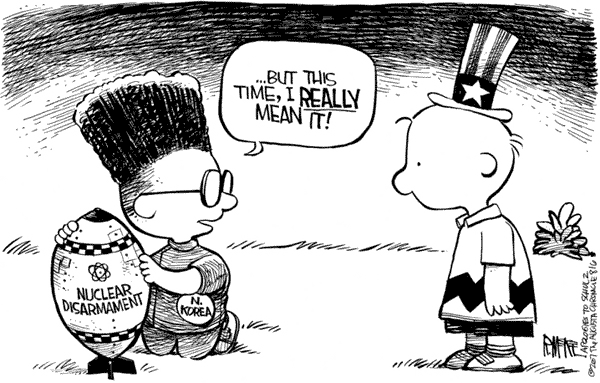 While we’re on the subject in reaction to North Korea’s nuclear weapons test over the Memorial Day weekend William J. Perry, Brent Scowcroft, and Charles D. Ferguson have an op-ed in the Wall Street Journal on reducing the nuclear threat. They note five components for reducing the threat:
While we’re on the subject in reaction to North Korea’s nuclear weapons test over the Memorial Day weekend William J. Perry, Brent Scowcroft, and Charles D. Ferguson have an op-ed in the Wall Street Journal on reducing the nuclear threat. They note five components for reducing the threat:
An effective strategy to reduce nuclear dangers must build on five pillars: revitalizing strategic dialogue with nuclear-armed powers, particularly Russia and China; strengthening the international nuclear nonproliferation regime; reaffirming the protection of the U.S. nuclear umbrella to our allies; maintaining the credibility of the U.S. nuclear deterrent; and implementing best security practices for nuclear weapons and weapons-usable materials worldwide.
They call for re-invigorated arms control talks between the U. S. and Russia and the U. S. Senate approving the Comprehensive Nuclear Test Ban Treaty, among other measures.
I think the only sticking point for the Obama Administration will be maintaining the credibility of the U. S. deterrent. Deterrence is a subject I’ve written about at some length. It has two components: the physical and the psychological. The physical component is possessing the ability to respond. The psychological component is having any prospective opponent believe that you may respond and IMO multiple successive presidents, largely through a lack of understanding of this vital component, have systematically undermined our nuclear deterrent. President Obama’s calls for complete nuclear disarmament (see here and here) have continued this practice and must be reversed if we’re to maintain a credible deterrent.
Cartoon: M.A.D.08


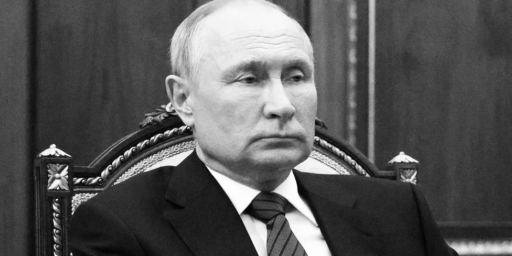
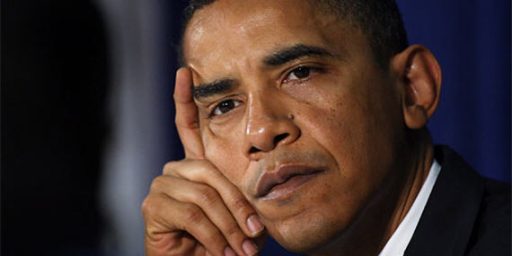
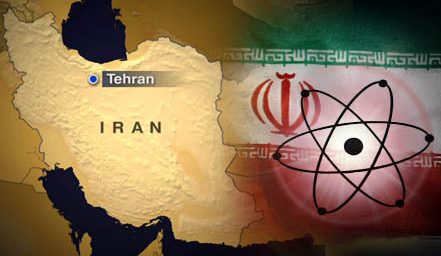
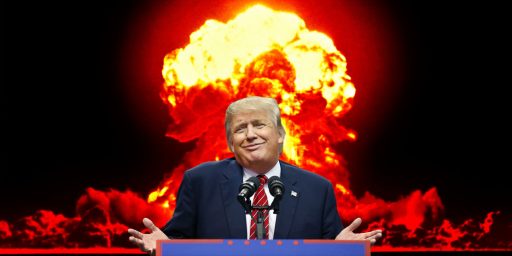
I think that should be “will respond non-proportionally.”
No, we have also reserved our right to respond at the appropriate level since the late 1950s when we abandoned the doctrine of Massive Retaliation in favor of Flexible Response. We may or may not respond massively or disporportionately, thus giving the National Command Authority the flexibility to judge what is the appropriate response given the threat, and not to escalate the situation beyond control.
DC Loser is right. The policy that’s been at least nominally in force for the last 40 years is one of strategic ambiguity.
But for that to succeed prospective enemies must believe that we might produce a nuclear response. If the use of nuclear weapons is unthinkable, there is no deterrence.
I am unconvinced we can make such a deterrent any longer, on two levels.
First, the overt reluctance on the part of the Democrats to use anything resembling a military soluton, attempting instead to solve the problem by means of meetings in Turtle Bay, wherein the biggest topic is the color of the drapes in the room, the shape of the table, etc.
Secondly, the horse is already out of the barn. The time to respond correctly to N. Korea… with a military response… was in the mid 90’s. Clinton considered it once, and then abandoned it. It was Clinton who allowed Kim Jung Il to break out of the nonproliferation that had been imposed on it by previous administrations. The horse, if you will, is now out of the barn.
And lst anyone think this to be an isolated thing, Iran has been watching and playing what they see the North doing, because it’s working. If North Korea, the definitional tinpot dictatorship, was allowed to disreard nonproliferation, to it’s advantage. what other country could be prevented from doing the same?
Clinton tried isolation, as liberals wanted him to, as opposed to responding correctly… but history shows us that’s exactly what such dictatorships need to survive… isolation. In other words, Clinton’s solution to the issue simply made things that much the worse.
Obama is of similar mind to Clinton on the matter, which is why we have an increase in activity there just now.
They know full well the only thing we’re going to respond with is forcefull backside to lip contact.
Any Obama voters having second thoughts now that “Yes we can” as an empty slogan pales in comparison to KJI’s “yes we can bomb you?”
Okay, I’ll admit I like Flexible Response much better than MAD. Flexible Response means we can intercept inbound ballistic missiles from NKorea, then obliterate Pyongyang and Tehran. MAD was always sort of a “you do me and I’ll do you” proposition.
Dave’s right about the shelf-life on deterrence. You need to nuke someone every 65 or 70 years to maintain credibility.
So…let me make sure I have everything straight…N. Korea’s nukes are all Clinton’s fault…N. Korea’s nukes are a direct threat to our country…diplomacy is useless…and anything short of military action is nothing more than ass kissing…where are Generals Ripper and Turgidson when we need them…
“The time to respond correctly to N. Korea… with a military response… was in the mid 90’s. Clinton considered it once, and then abandoned it.”
Essentially correct, for at the time (Spring/Summer of ’94) South Korea was willing to contemplate supporting a U.S. attack on the NORK nuke sites. Ultimately, we (and most importantly, S.K.) were to re-think the idea and signed the Agreed Framework with N.K. in the fall of ’94. We rationalized that N.K. would implode before they could go nuke.
It is also significant to note that when we detected N.K. violations of the agreement in ’98 (they re-started the removal and processing of the spent fuel rods from Yongbon), the Clinton Admin offered a non-response (actually, they kept the reports quiet), no doubt due to Monica-induced impotence.
So, to be short, yes, (and Madeline Albright’s false claims to the contrary), “…N. Korea’s nukes are all Clinton’s fault.” The best opportunity to kill the program was during Clinton’s term, before the death of Kim Il Sung, before S.K.’s “Sunshine Policy”, and before N.K. acquired the technology and materials to manufacture a working nuclear device.
“…diplomacy is useless…”
Absolutely not true.
What is useless are those diplomats and their political masters who fail to recognize when diplomacy has run it’s course.
I would assume that, using North Korea as an example, all the geopolitical geniuses out there would argue that now is the time to do something about Iran? Do tell, exactly what could we do militarily that wouldn’t be more damaging to us than doing nothing militarily…
Oh my goodness, what’s this!? Some calm, clear advice on how to respond to North Korea…granted, it probably won’t appeal to most of the armchair warriors among us…
“Do tell, exactly what could we do militarily that wouldn’t be more damaging to us than doing nothing militarily…”
By doing nothing militarily, we ensure that Iran will acquire an operational nuclear weapons capability (warhead and delivery system) within 5 yrs, max. We are then left to take our chances with MAD and the application of Rational Actor Theory to a group of ostensibly irrational people.
Good luck with that.
Why do I sense that the use of the term “geopolitical geniuses” was not intended as a compliment?